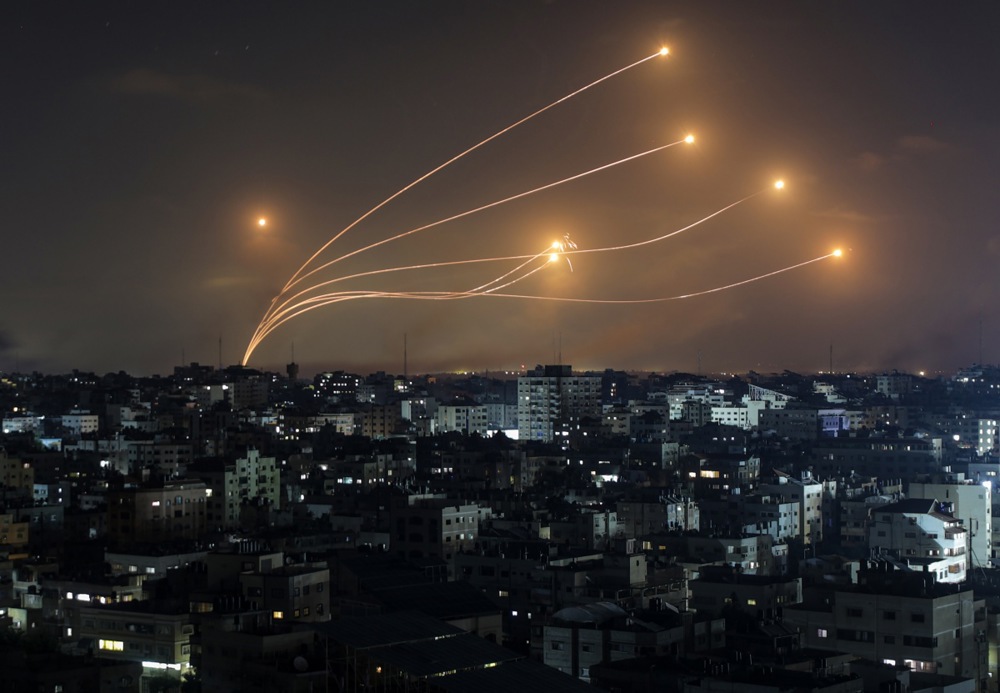For friends of Israel, the murderous events in Lebanon last week were a sobering reminder that all wars are fought by evil means, and innocent people, including children, invariably die. That this war is not of Israel’s making does not relieve one’s sense of pity and sorrow for all those Shia families in Lebanon who lost a son or father, brother or uncle or an entirely innocent child. We have all seen too many funerals of dead activists to be in any doubt about the authenticity of the grief or the kinetic impact on younger male mourners, as the bereaved of a grieving dusk become the recruits of an angry dawn.
This is now the inevitable, invariable cycle of Israel’s perma-war, endlessly changing merely in technology and scale. Only three times in human history have more people been killed or wounded intentionally in a single moment: the first in the British landmine explosions beneath German positions on Messines Ridge in June 1917, and in the atom bombings of Hiroshima and Nagasaki.
The pager attack required not merely extraordinary quantities of logistical genius but also of moral certainty: many in Europe or the US could manage not merely the former, but also the latter? The architects of this monstrosity must have known that perhaps thousands of people would be maimed for life (if not killed) in that evil trice. How did they feel when planning it? How did they feel as news came through of their triumph?
I use these words – murderous, monstrosity and evil – advisedly. War is an evil thing, but the English language has the term “the lesser of two evils” for a reason. War is intrinsically evil, fought by intrinsically evil means: it is the intended outcome that must be one factor in assessing the morality of any war.
However, even this can be masked in the myths of the aftermath. Most British people know of the Dam Busters’ raid in May 1943, the attacks on the reservoirs suppling the Ruhr industrial complex with hydroelectricity. Who knows that the raids failed to effect electricity supply in any way, and that 1,300 Ukrainian slave-workers, most of them women, were drowned? And who has ever heard of Pforzheim, the town known as “Goldstadt” because of its tiny workshops making watches and jewellery and which RAF intelligence knew that, because it was so militarily unimportant, it was undefended by flak-batteries. This enabled bombers to fly unmolested at a perfect altitude to lay it waste one February night in 1945, killing some 17,600 civilians in about 45 minutes.
War generates myth, amnesia and cliché in prodigious amounts, often robbing warlike events of both meaning and moral context. People generally refer to David and Goliath contests as if the outcome must favour the latter, though in every single iteration of that myth, David is the victor, making the myth meaningless.
Likewise, American newspapers have referred to Israel’s exploding pager attack on Hezbollah as its “Pearl Harbour,” apparently unaware that within less than four years, the Japanese had signed a document of unconditional surrender, and within a generation the Japanese were eating hamburgers, drinking milkshakes and playing baseball.
Indeed, history can often be more about forgetting than remembering, and this is especially true of Lebanon, where the competing tribes have little sense of others’ memories while they cherish their own ancient hurts, rubbing old scars until they are once again open wounds, the Shia in particular. Who now remembers the deliberate Shia rocket attack on a football field of Israeli Druze teenager-footballers on the Golan Heights two months ago? This is unlikely to have been random: the Shia detest the Druze for being loyal to the state of Israel, furnishing the Jewish homeland with some of its finest fighters. The Druze are similarly unlikely to forget that calculated atrocity, though if Hezbollah remember it all today, it would probably be as a fond and celebratory recollection.
But even more likely, the football massacre has vanished amid the howls of agony and mortal pain of thousands of men being blown up simultaneously, though not exactly without provocation: Hezbollah has fired 6,600 rockets into Israel this year. This did not prevent the leader of Hezbollah (meaning the Party of God) Hassan Nasrallah (meaning Victory of God) from saying that the pager attacks had crossed “a red line.” It would require an Islamist theologian to explain how and why what the Israelis had done was more red-line-ish than firing 6,600 rockets.
So why now Operation Pager? That of course is the question, which no one outside the ranks of Mossad and the Israeli war-cabinet can answer. But still, why now, nearly a year after the greatest single atrocity in Israel’s history, in which 1,200 party-going revellers were slaughtered, many women after being raped, and hundreds more were taken captive? Post-pager, what future now awaits the (probably few) survivors? And though Hezbollah is not famous for its foreign operations, on occasion it can match Al Qaida and Hamas in its lethal reach, once bombing an airliner full of Jews in Panama and on another occasion slaughtering Jews at a synagogue in Buenos Aires.
Moreover, whatever steps the Israelis try to take not to kill innocents, neither Hamas nor Hezbollah even acknowledge or understand such a concept when dealing with Israelis or Jews generally. So, in the final question in this series: how safe are Jews anywhere now in their diaspora from the vengeful wrath of a defeated Hezbollah, who in their many myths always suffer but then always rise again, shedding their own blood as plentifully as their enemies’?
The fate of the hostages and the timing of the mass assault on Hezbollah cannot be separated. The speculation by some within the ranks of the well-informed (which do not include this author) is that the pager operation was likely soon to be exposed. It was, moreover, such a complex and brilliantly-organised plot that not to use it against a foe that has made much of Northern Israel uninhabitable was unthinkable, not least because the fate of the hostages was probably already sealed. They have largely served as bait for outsiders to urge caution and restraint on Israel, and whenever Israel complied, no hostages were released. The recent cold-blooded murder of four hostages in a tunnel where they might have been imprisoned for nearly a year in unspeakably insanitary conditions could have been the trigger for the long-awaited anti-Hezbollah operation to begin.
No matter the truth of the details of the most brilliant military exploit since the Trojan Horse, the larger truth remains, which just about every Jew in the world understands, and the entire population of Israel certainly does: that the Jewish state is now in a state of perma-war.
This not just because of its enemies on its borders but those across the sea, in Iran and Yemen, from where a hypersonic missile was fired the other day, hitting but causing no casualties in Tel Aviv. Iran’s larger strategy is surely to bankrupt Israel by forcing it to employ vast resources to defend itself against vast numbers of missile attacks from neighbouring states and from remote ones, perhaps one day acting in synchrony. Indeed, perhaps it was the possible imminence of such organised mass attacks that caused Mossad to launch its pre-emptive strikes last week.
If not then, and if not now, then soon: this is inevitable while the ancient state of Persia is governed by Shia fanatics who want to wage war against their Sunni rivals in Saudi Arabia and against the Jew-infidel in what they call “Palestine,” though the term has no real historical meaning other than being the etymological root of the word “philistine.” Which is indeed is an appropriate term to use about those campus-idiots across the anglophone world who refer to the military operations in Gaza as “genocide.” The Israelis have never even done a Pforzheim never mind a Treblinka on anyone, and certainly not in Gaza, where the slow anti-Hamas operations have now lasted nearly a year. The German crushing of the Warsaw ghetto in 1943, by contrast, lasted three weeks and resulted in just 17 German dead and many thousands of dead Jews, compared to the 713 Israeli soldiers killed in the Gaza area since October 7, including four last Tuesday, the opening day of the Pager Offensive.
One needs to be neither a moral philosopher nor a mathematician to detect the slight differences. There is one further vital and defining dissimilarity between the sides: Israel does not want and cannot afford a perma-war, but Iran, Hezbollah and Hamas do and can. They have a vast and conjoined Islamic arena to move within, from Morocco on the Atlantic to Iran alongside the Caspian and south to Yemen along the iron shores of the Indian ocean, in all, several million square miles in area, with an eternity in paradise in another and perhaps more rewarding dimension: in other words, the Islamist equivalent of E=MC2. Whereas the Jews of Israel are cooped up in a small state roughly the size of East Anglia, the Lowlands of Scotland, the Vendée or the Algarve. So, who precisely is the oppressed here and who the oppressor?
Kevin Myers is an Irish journalist, author and broadcaster. He has reported on the wars in Northern Ireland, where he worked throughout the 1970s, Beirut and Bosnia.





Hamas hostages and mass slaughter mean Israelis must pursue and destroy